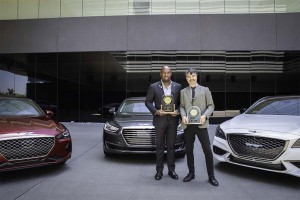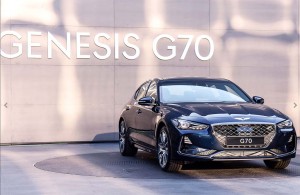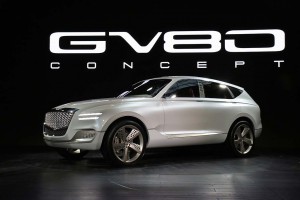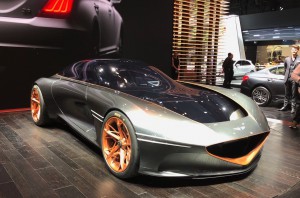It’s not often that a senior brand executive is pleased to see his sales slide by more than 50 percent, but Erwin Raphael says the sharp year-over-year decline Genesis reported last month is pretty much right on target.
Two years after it was spun off by Hyundai as a standalone luxury brand, Genesis is in the midst of some major changes that will determine its long-term success. That starts with the upcoming launch of the 2019 G70, which targets the likes of the vaunted BMW 3-Series, as well as the first Genesis SUV expected to join the line-up next year.
The Korean marque is also getting ready to launch its own standalone dealer network in the coming months, one that will see the number of Genesis outlets in the U.S. drop by more than 85 percent. But, as with sales, bigger numbers aren’t always better when you’re launching one of the first new luxury brands in decade, insists Raphael, the executive director of Genesis Motor America.
“We anticipated this” sales decline, which saw Genesis dealers deliver just 796 vehicles in June, compared to 1,613 a year earlier. For the first half of 2018, deliveries totaled 7,262, down from 9,901 the prior half-year. “We are off our business plan by 3 percent.”

Genesis Motor America boss Erwin Raphael accepts the award for #1 brand in J.D. Power's 2018 Initial Quality Award.
While that might seem like a case of CYA, a closer look reveals that Genesis has been taking a number of steps guaranteed to cut sales. For one thing, it stopped importing its two current Korean-made product lines, the G90 and G80, three months ago. That reduces inventory at the dealers who will be dropped as Genesis begins the rollover to a standalone network, Raphael explains.
Currently, the brand has about 850 showrooms it shares with Hyundai. The goal, over the next few years, is to have 100 dedicated showrooms of its own. Only dealers who will build those outlets will get 2019 models, including the new G70 which will go on sale by late summer, the Genesis chief explained during a lengthy conversation in Maine, where journalists were given a chance to drive the sporty compact this week.
The decision to go with a unique dealer network is a costly one. Genesis and its parent are in the process of negotiating with both existing and new dealers, and observers anticipate the costs will run well into the millions of dollars.
But it’s clearly necessary, according to Raphael, who notes that while Genesis has scored extremely well in terms of both product reviews and in quality studies, such as the recent J.D. Power Initial Quality Survey, it was at the bottom of Power’s Sales Satisfaction Index. Luxury customers simply don’t want to go shopping in the same showroom as a Hyundai buyer, Raphael contends.
(Big surprise in 2018 Power IQS as Korean’s overwhelm Euro, Asian and American competitors. Click Here for more.)
During the transition, Genesis has taken another unusual step, sharply pairing back its marketing efforts. That might seem an unusual step for a brand in launch mode and, indeed, the result has been a sharp cut in “unaided brand awareness,” the ability of consumers to recall a brand name without some hints. Even before the marketing cuts, Genesis was recognized by only about 6% of American motorists, and that has been cut in half, to 3%, Raphael acknowledged, stressing that there’s little value in spending money to advertise at this moment.
Once the new showrooms and the 2019 line-up are in place, meanwhile, expect to see Genesis take a relatively low-key, targeted approach to marketing, rather than blasting out high-profile – and high-cost – TV ad campaigns. There will be much more of an emphasis on carefully focused Internet marketing going forward. Expect to see Genesis focus on specific markets, such as Los Angeles and New York, as well as carefully targeted buyer groups, such as LGBTQ motorists. The brand will even take small steps, such as paying valets at high-profile restaurants and clubs to park Genesis cars out front.
While Genesis is expecting relatively big things for the new 2019 G70, not all observers are quite so confident. Analysts generally are betting that the brand will have to wait at least until the 2020 model-year, when it launches its first sport-utility vehicle, widely expected to be based on the GV80 Concept unveiled at the New York Auto Show in April 2017.
The market has changed radically since parent Hyundai first committed to spinning off Genesis as a standalone brand. Where sedans and coupes dominated the luxury market early in the decade, utes now account for more than half of the segment’s overall sales, in-line with the overall American automotive market.
It’s widely expected that the production version of the GV80 will be followed by at least two other utility vehicles in the next few years.
That said, Genesis isn’t abandoning traditional luxury segments. The automaker scored one of the big hits at this year’s New York Auto Show when it rolled out the Essentia concept this past April.
(Click Here for a closer look at the Genesis Essentia.)
Calling it a “brand ambassador,” Genesis EVP and Head of Design Luc Donckerwolke said the goal was to “create a…pure…icon” with the exotic sports car. While he declined to reveal whether there are any future plans for the Essentia, following a presentation at this week’s G70 event, he did little to suggest a production version has been ruled out.
If anything, Genesis remains a work in progress. For now, there are “no plans” for a high-performance sub-brand akin to Mercedes-AMG or BMW M, several officials told TheDetroitBureau.com. No plans for now, anyway. Genesis is taking small steps to see how the market reacts, and it clearly intends to remain flexible and quick to adapt in the years ahead.
(To check out our first drive in the Genesis G80, Click Here.)



